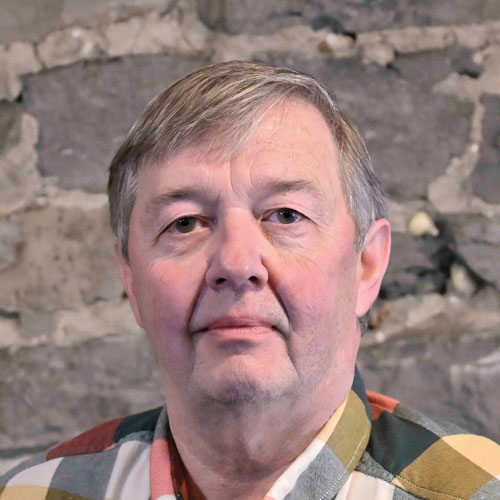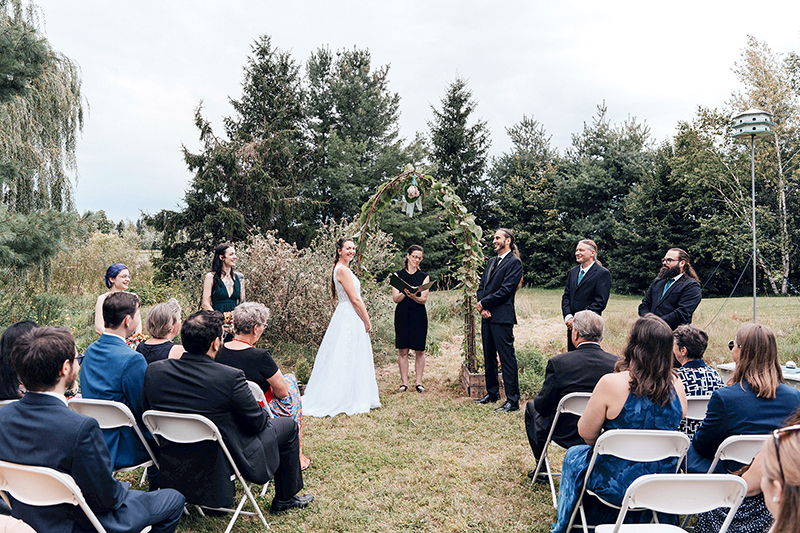In preparing a ceremony, Carrie Fawcett takes great care to personalize the event, which gives it greater meaning than a “one size fits all” approach. Courtesy photo used by permission of Arielle Livernoche
Do you ever find yourself looking for the meaning in your life? Maybe you’re in a transitional stage of your life, or have suffered a loss, both situations that deserve and require our full attention, but which can often receive far less. Who would you ask for help in making the important moments in your life more meaningful?
Carrie Fawcett is a ceremonialist and a certified celebrant. Through the service she provides she can help navigate some of the most important moments of a life. “What I do with clients is I create, and I officiate ceremonies that are personalized and meaningful,” said Fawcett. “It’s to help them to acknowledge an important transition in their life and also to more fully support them (in) making that transition.”
The transition could be a wedding, or an end-of-life ceremony, or a birth. It could be a rite of passage for someone in the family, or perhaps someone is going through a transition period, a divorce, new job, or virtually anything that involves change. There are many different occasions characterized by transition and a ceremony is meant to support people through those transitions.
“In a transition, you’ve got maybe a role that’s changing, or a relationship or identity that’s changing, someone is going maybe from being in their full-time working life to being retired. That’s a big transition,” said Fawcett. “Maybe someone’s going from being a single person to being married and being a couple. Maybe someone’s going from not having any dependents to being a mother or father. Having the ceremony is a way to support them to be more present, more empowered in their life, and just to stay in the natural flow of their life, versus potentially kind of getting stuck and not get over something or fully step into a role.”
The death of a cherished pet is another area where a ceremony may be helpful. “That’s an area where people may not realise that’s an option,” says Fawcett. “They may do something to honour their pet. Sometimes, though, it can help to have someone support them in doing so. Maybe they’re not feeling very creative about it, or they’re just feeling the grief and could use some help.”
An important part of what Fawcett does is to personalize the ceremonies because in doing so, people become empowered during their transition. “It is important for a person to choose the music, the actions, the rituals, the symbols, physical things, even in the space of people who are present for a person to choose with care, so that it’s supportive to what they are intending to do. It’s all supportive of them and of the ceremony. So, yeah, the personalization really, really makes a difference. A person may not feel a part of their own ceremony if that’s not considered.”
Fawcett has been involved in ceremony for much of her life. Earlier in her life, she studied as a musician and as a classical singer and did sing at weddings and funerals and somewhat larger events like graduation ceremonies. She was reintroduced to it around 2017 when she began getting much more involved in ceremony and was reintroduced to it through dance ceremonies.
“I was looking for ways to use some of the skills that I’d built in other kinds of work or in other experiences,” said Fawcett. “I’ve done a lot of things in the arts, music, and theatre. I’d worked with language as an ‘English as a Second Language’ teacher, I had studied different kinds of dance, and I was looking for meaningful ways to use these skills. And this was a way to bring them all together, and to be of service and to focus them.”
If you look at life as a passage — we pass into this life, we go through it and then we pass out of it — then it is easy to see how some might like or even require a bit of help navigating the highs and lows. Or maybe we just don’t pay some events the attention they deserve.
“Our culture hasn’t really taught us or made ceremony a really prominent part of our lives,” said Fawcett. “Yes, there are certain ceremonies that are happening: weddings are popular, people have funerals, people have graduations, those are happening. But there are so many other important passages.”
To find out more about what is available, you can contact Carrie Fawcett by phone at 343-571-2979, or by email at carrie@carriefawcett.com. She offers a free, no obligation initial call to talk about what’s coming up for a prospective client, or what ceremony they are thinking of, whether they have really refined ideas about or just a rough idea about what they want.
She also has a newsletter which you can subscribe to at https://carriefawcett.com/newsletter.
If you would like to have a light shined on your business, please contact us at: editor@etceterapublications.ca or call us at 613-448-2321.

Terry Tinkess is a professional photographer, educator and journalist. He has been making a living with a camera and keyboard since 1999 and has been featured in such publications as The Ottawa Citizen, Cornwall Standard Freeholder, The Globe and Mail, The Miami Herald, Ottawa Construction News, The Ontario Construction Report, Ontario Home Builder Magazine, Reed Construction Data, Canadian Potato Business and most recently, The Record and Eastern Ontario AgriNews. Terry lives in Ingleside, Ontario with his wife Brenda, Mia the anxious Pittie and cats Wally and Chubbers.









